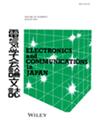FIR型逆控制器的数据驱动预测和LASSO控制
IF 0.5
4区 工程技术
Q4 ENGINEERING, ELECTRICAL & ELECTRONIC
引用次数: 0
摘要
本文针对理想控制器结构未知的情况,提出了数据驱动控制。在这种情况下,实现FIR型控制器是很自然的。在这里,我们将FRIT用于FIR型逆控制器的情况。一般来说,FIR可能有不必要的大量抽头。为了防止这种情况,我们还利用LASSO回归,以便在尽可能少的抽头数下实现FIR型逆控制器。此外,我们还利用数据驱动的预测来确定LASSO回归所需的超参数。实验验证了该方法的有效性。本文章由计算机程序翻译,如有差异,请以英文原文为准。
Data-driven control by using data-driven prediction and LASSO for FIR typed inverse controller
In this paper, we propose data-driven control for the case of that the structure of the ideal controller is unknown. In this case, it is natural to implement FIR typed controller. Here, we utilize FRIT for the case of FIR typed inverse controller. In general, FIR might have unnecessarily large number of its taps. To prevent it, we also utilize LASSO regression so as to realize FIR typed inverse controller in as less numbers of the tap as possible. Moreover, we also utilize data-driven prediction to determine hyper parameters required in LASSO regression. The validity of our proposed method is verified by using experiments.
求助全文
通过发布文献求助,成功后即可免费获取论文全文。
去求助
来源期刊

Electronics and Communications in Japan
工程技术-工程:电子与电气
CiteScore
0.60
自引率
0.00%
发文量
45
审稿时长
6-12 weeks
期刊介绍:
Electronics and Communications in Japan (ECJ) publishes papers translated from the Transactions of the Institute of Electrical Engineers of Japan 12 times per year as an official journal of the Institute of Electrical Engineers of Japan (IEEJ). ECJ aims to provide world-class researches in highly diverse and sophisticated areas of Electrical and Electronic Engineering as well as in related disciplines with emphasis on electronic circuits, controls and communications. ECJ focuses on the following fields:
- Electronic theory and circuits,
- Control theory,
- Communications,
- Cryptography,
- Biomedical fields,
- Surveillance,
- Robotics,
- Sensors and actuators,
- Micromachines,
- Image analysis and signal analysis,
- New materials.
For works related to the science, technology, and applications of electric power, please refer to the sister journal Electrical Engineering in Japan (EEJ).
 求助内容:
求助内容: 应助结果提醒方式:
应助结果提醒方式:


